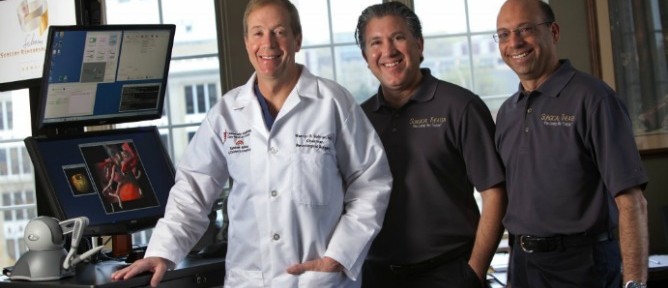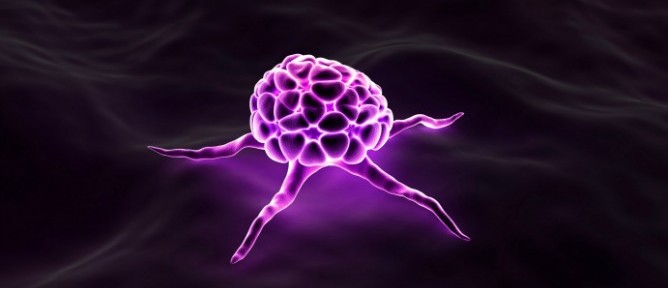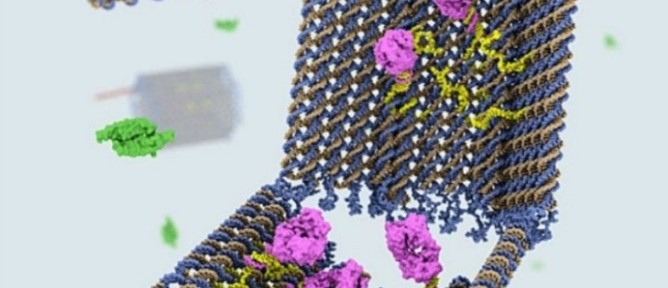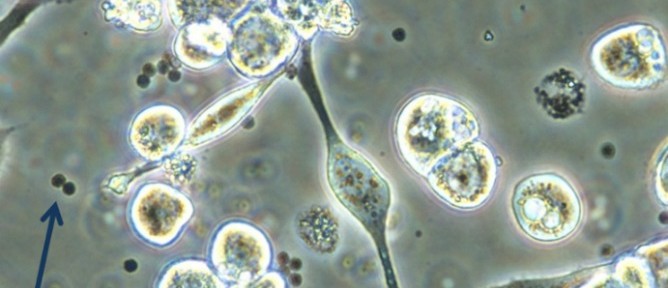ERETZ AND GALUT: Technology and Innovation
Better brain surgery, with flight simulation tech
Two Israel Air Force vets are behind the Selman Surgical Rehearsal Platform that lets neurosurgeons practice for difficult cases.


From left, Dr. Warren Selman, Moty Avisar and Alon Geri. Photo by Keith Berr Photography
by Abigail Klein Leichman
Just as pilots can use flight simulators to practice for difficult missions before setting foot in a plane, now brain surgeons can rehearse challenging microsurgical procedures before making a single incision.
Already in use at US teaching hospitals and soon to be available to practicing neurosurgeons, the Selman Surgical Rehearsal Platform (SRP) neurosurgery simulator generates 3D images from the individual patient’s standard CT and MRI scans. The lifelike preview shows how surgical instruments will interact with the patient’s tissue and how the delicate brain structures will respond.
Cancelling cancer cells with new radiation
Israeli scientists find a way to generate millimeter rays and use them to render cancer cells incapable of reproducing.


Israeli scientists hope to be able to render cancer cells like this one incapable of reproducing. Image via Shutterstock.com
by Abigail Klein Leichman
Somewhere on the spectrum between electromagnetic waves that produce visible light, and those that cook food in a microwave oven, are millimeter waves that might hold the key to conquering cancer cells.
When tested in an Israeli lab on human lung-cancer cells, millimeter wave radiation knocked out the cells’ ability to reproduce.
Nanobot ‘truck’ delivers lifesaving cargo
Using the new complex science of DNA origami, an Israeli biologist folds genetic material into a unique targeted delivery system for drugs.


This image of the DNA nanobot, courtesy of Shawn Douglas, was created with Molecular Maya and Cadnano software.
by Abigail Klein Leichman
Origami, the Japanese art of paper folding, is thousands of years old. DNA origami, the science of folding genetic material, was invented only in 2006. Ido Bachelet, an Israeli structural and computational biologist, is one of the few people in the world who’s an expert at this.
But he’s not folding DNA strands into pretty cranes and butterflies. As he explains in a Nature videowith his Harvard research partner Shawn Douglas, Bachelet’s microscopic structures could perform many useful medical tasks.
A ‘vaccine’ to boost global food production
A revolutionary new seed treatment from Morflora could improve the world’s agricultural output, without the need for worrying genetic engineering.

Morflora can deliver any genetic trait to any seed without transforming the genome of the treated plant. Photo by Shutterstock.
by Karin Kloosterman
Space-age rapid transit to debut in Tel Aviv
Developer of NASA-designed skyTran chose Israel as the perfect place to pilot the software-guided personal transport pods that glide on a cushion of air.
by Abigail Klein Leichman

Magnets pull skyTran vehicles off the ground.
If all goes as planned, within two years Israelis will be the first people to try out a futuristic rapid transport system designed by NASA’s Ames Research Center in Silicon Valley, California.
The skyTran uses two-person modules that drive along a guide rail suspended from existing power lines. Magnets in the vehicle create a magnetic field around the metal coil inside the rail, causing the vehicle to lift up and glide 60 miles per hour on a cushion of air. The system uses very little energy and potentially could be powered entirely by solar panels.
Camera ‘sees’ through skin, around corners
An early-stage Israeli invention could one day make the surgical biopsy obsolete.

Weizmann Institute researchers Ori Katz, left, and Eran Small.
by Karin Kloosterman
Researchers at the Weizmann Institute of Science in Rehovot, Israel, have discovered a new physics trick. While it’s not exactly Superman vision –– yet — the camera developed by Ori Katz, Eran Small and Prof. Yaron Silberberg sees through objects using a simple light bulb, a standard digital camera and the basic technology found in everyday digital projectors.
Their camera can see through nearly opaque surfaces such as skin or frosted glass — even around a corner into another room if the door is open.
Top 10 ways Israeli scientists are battling breast cancer
In honor of Breast Cancer Awareness Month, ISRAEL21c has put together a list of the top 10 latest Israeli advances in breast cancer.

One in eight women will develop breast cancer in her lifetime. Israeli scientists hope to improve the odds. Photo by www.shutterstock.com
by Abigail Klein Leichman
One out of every eight women will develop breast cancer in her lifetime. It is the most commonly diagnosed non-skin cancer in women worldwide, and also strikes thousands of men.
Though the three areas with the highest breast cancer rates are Western Europe, Australia/New Zealand and Northern Europe, Israel has taken a leading role in researching causes and treatments. The Breast Cancer Research Foundation’s very first international research grant was awarded in 2001 to Shaare Zedek Medical Center’s Dr. Ephrat Levy-Lahad to do a comprehensive Israeli Breast Cancer Study, now an international model for genetic breast cancer prevention screening.
New Israeli tactic makes deadly viruses commit suicide
Vecoy Nanomedicines has a whole new approach: a virus ‘decoy’ to outwit the world’s worst enemy before it does any damage.

Virus-infected cells after treatment with Vecoy. Photo courtesy of Shmulik Ittah and Yaniv Amir
by Karin Kloosterman
There’s the West Nile Virus forging a deadly path in North America, and a new round of Ebola in Africa. Then there’s bird flu, SARS and a handful of other rampant and unusually evil viruses circling the globe. Any new super virus out of control could be far worse than the Spanish flu outbreak of 1918, which killed 40 million people in just two years, says Israeli biologist Erez Livneh, CEO and founder of a new biotech company Vecoy Nanomedicines.
“Viruses are one of the biggest threats to humankind,” Livneh tells ISRAEL21c. “A viral pandemic could be more damaging than global warming or the Iranian nuclear program.”
Made in Israel – The top 64 innovations developed in Israel
To celebrate Israel’s 64th birthday, ISRAEL21c brings you the country’s top 64 innovations — developments that are transforming and enriching lives across the planet.
When Israel was founded 64 years ago, it was a barren country with no natural resources, little water, and more than half of its land mass desert. The only thing the new country had going for it was the natural creativity of its people.
More than six decades later, the Israelis have turned their country into an oasis of technology and innovation. With the most startups per capita worldwide, and the third highest number of patents per head, Israel has become one of the leading players in the world of high-tech innovation, attracting international giants to its shores.
From health breakthroughs to technology, agriculture, the environment and the arts, the country’s innovations are transforming and enriching lives everywhere. Israel today is playing a significant role in some of the most important challenges facing our planet.
Not bad for a country the size of New Jersey.
To celebrate Israel’s birthday, we give you a list of the country’s top 64 innovations. Enjoy!

Making every drop count in Africa
Israeli irrigation know-how is directly helping farmers in 12 Senegalese regions to increase yields and cut down on pesticides.
By Rivka Borochov
Since its founding in 1948, Israel has had a thirst to grow crops in the desert. It wasn't just a technological challenge, but a matter of survival. Today, Israel offers some of the world's hottest technologies in desalination, water reclamation and crop irrigation.
But the Jewish nation hasn't forgotten those early days, when Israel hadn't enough to drink, let alone to water fields. To help Africans in a similar situation, the Israeli Foreign Ministry's MASHAV (Agency for International Development Cooperation) has developed Tipa ("drop") to transfer Israeli drip-irrigation water technology to remote areas in Senegal, where basic amenities, even electricity, are lacking.
By Rivka Borochov
Since its founding in 1948, Israel has had a thirst to grow crops in the desert. It wasn't just a technological challenge, but a matter of survival. Today, Israel offers some of the world's hottest technologies in desalination, water reclamation and crop irrigation.
But the Jewish nation hasn't forgotten those early days, when Israel hadn't enough to drink, let alone to water fields. To help Africans in a similar situation, the Israeli Foreign Ministry's MASHAV (Agency for International Development Cooperation) has developed Tipa ("drop") to transfer Israeli drip-irrigation water technology to remote areas in Senegal, where basic amenities, even electricity, are lacking.
Doomsday weapon: Israel’s submarines
Ynetnews - Rare glimpse into Israel’s doomsday weapon – the submarine fleet
by Alex Fishman
The day the Twin Towers collapsed in Manhattan, September 11, 2001, Israeli submarine “Leviathan” of the advanced Dolphin model was on a training sail somewhere at sea – the exact location of Israel’s submarines will always remain classified, even dozens of years after the fact. At one point, the submarine rose to the surface to take a break. The sub’s commander, then-Lt. Colonel Oded, looked through the periscope and saw a calm, blue sea. However, one crew member soon informed him that he just saw the New York towers collapsing on television. Oded’s first reaction was laughter: What kind of movie are you watching there? How could the Twin Towers collapse? Yet soon after, the official announcement arrived from Israel.
Read more »
by Alex Fishman
The day the Twin Towers collapsed in Manhattan, September 11, 2001, Israeli submarine “Leviathan” of the advanced Dolphin model was on a training sail somewhere at sea – the exact location of Israel’s submarines will always remain classified, even dozens of years after the fact. At one point, the submarine rose to the surface to take a break. The sub’s commander, then-Lt. Colonel Oded, looked through the periscope and saw a calm, blue sea. However, one crew member soon informed him that he just saw the New York towers collapsing on television. Oded’s first reaction was laughter: What kind of movie are you watching there? How could the Twin Towers collapse? Yet soon after, the official announcement arrived from Israel.
Read more »
S&P raises Israel's credit rating from A to A+
At the time like this when most of the developed economies experiencing financial difficulties, to say the least. When a whole bunch of countries have been downgraded (some to junk), and more to come. When USA's credit has been downgraded for the first time in history. Unprecedented. It's an A+ grade for Israel's economic and financial health. Kol haKavod!
JPOST - Finance Minsiter Yuval Steinitz and Bank of Israel Governor Prof. Stanley Fischer praise move as "badge of honor" and reward for Israel's responsible actions during global economic crisis.
International credit rating agency Standard & Poor's announced on Friday that it has raised Israel's credit rating from A to A+. The company said that the decision reflects the government's responsible economic policy. Company officials said they do not believe the national budget will explode despite the mass social justice protests demanding reformed economic policies.
Read more »
JPOST - Finance Minsiter Yuval Steinitz and Bank of Israel Governor Prof. Stanley Fischer praise move as "badge of honor" and reward for Israel's responsible actions during global economic crisis.
International credit rating agency Standard & Poor's announced on Friday that it has raised Israel's credit rating from A to A+. The company said that the decision reflects the government's responsible economic policy. Company officials said they do not believe the national budget will explode despite the mass social justice protests demanding reformed economic policies.
Read more »
Israel and France form new partnership to assist developing countries
 |
| MASHAV Dep.Dir-Gen Danny Carmon (right) and HE Christophe Bigot sign aid cooperation agreement (Photo: MFA) |
Israel and France signed (September 5) a declaration of intent for cooperation in extending aid to Haiti and to emerging countries in Africa. The agreement includes joint actions in the fields of agriculture and irrigation, public health and gender. Implementation of the agreement will be through MASHAV - Israel's Agency for International Development Cooperation, at the Foreign Ministry.
Development is an important subject on the international agenda, especially against the backdrop of recent global crises (food, climate change, energy, etc.), which mainly hurt developing countries, many of which suffer from extreme poverty and hunger. Both Israel and France view this joint activity as adding a new phase to their relationship.
The Israeli-French cooperation will focus on sending experts, counseling, professional training and the like, appropriate to the needs and desires of the country receiving the aid. In the first stage, the countries designated to receive aid are Cameroon, Senegal, Ghana, Burkina Faso and Haiti.
A steering committee composed of representatives from Israel and France, charged with monitoring implementation of the agreement and approving the work plans, will meet once a year.
Source: Israel Ministry of Foreign Affairs
TechCrunch gives Israelis own area
Jewish state expected to have impressive representation in Web publication's Disrupt conference this year
Ynetnews
Il-Il Ben Zur-Laron
It's unclear whether leading Web publication TechCrunch is alarmed or amazed by the number of Israeli startups flooding its Disrupt conference in the past few years, but to be on the safe side, it decided this year to dedicate a special area for the Israeli development groups.
The TechCrunch competition has been known to be a huge booster for new startup companies, both those who win and those who don't but manage to create a buzz and gain exposure for their ideas and products.
Read more »
Ynetnews
Il-Il Ben Zur-Laron
It's unclear whether leading Web publication TechCrunch is alarmed or amazed by the number of Israeli startups flooding its Disrupt conference in the past few years, but to be on the safe side, it decided this year to dedicate a special area for the Israeli development groups.
The TechCrunch competition has been known to be a huge booster for new startup companies, both those who win and those who don't but manage to create a buzz and gain exposure for their ideas and products.
Read more »
Israeli aid group off to Africa
Humanitarian group sends delegation to aid thousands in Kenya and Somalia after drought.
The Jerusalem Post
by GIL SHEFLER
An Israeli humanitarian group has sent a delegation to the border of Kenya and Somalia to aid tens of thousands of locals displaced by the worst drought to have hit the Horn of Africa in over 60 years.
IsraAID, in partnership with Operation Blessing International, said on Thursday it had dispatched four Israeli aid workers to a town near the border between the two countries earlier in the week.
“Words cannot describe the situation here. I have never seen anything like it,” said Dana Manor, an experienced aid worker who was in Sri Lanka after the 2004 tsunami and in Haiti after the 2010 earthquake. “We visited the camps and the overwhelming refugee influx is putting a stress on the existing infrastructure, people are constantly requesting food, tents [shelters], access to the schools, and water.”
Read more »
The Jerusalem Post
by GIL SHEFLER
An Israeli humanitarian group has sent a delegation to the border of Kenya and Somalia to aid tens of thousands of locals displaced by the worst drought to have hit the Horn of Africa in over 60 years.
IsraAID, in partnership with Operation Blessing International, said on Thursday it had dispatched four Israeli aid workers to a town near the border between the two countries earlier in the week.
“Words cannot describe the situation here. I have never seen anything like it,” said Dana Manor, an experienced aid worker who was in Sri Lanka after the 2004 tsunami and in Haiti after the 2010 earthquake. “We visited the camps and the overwhelming refugee influx is putting a stress on the existing infrastructure, people are constantly requesting food, tents [shelters], access to the schools, and water.”
Read more »
Subscribe to:
Posts (Atom)




